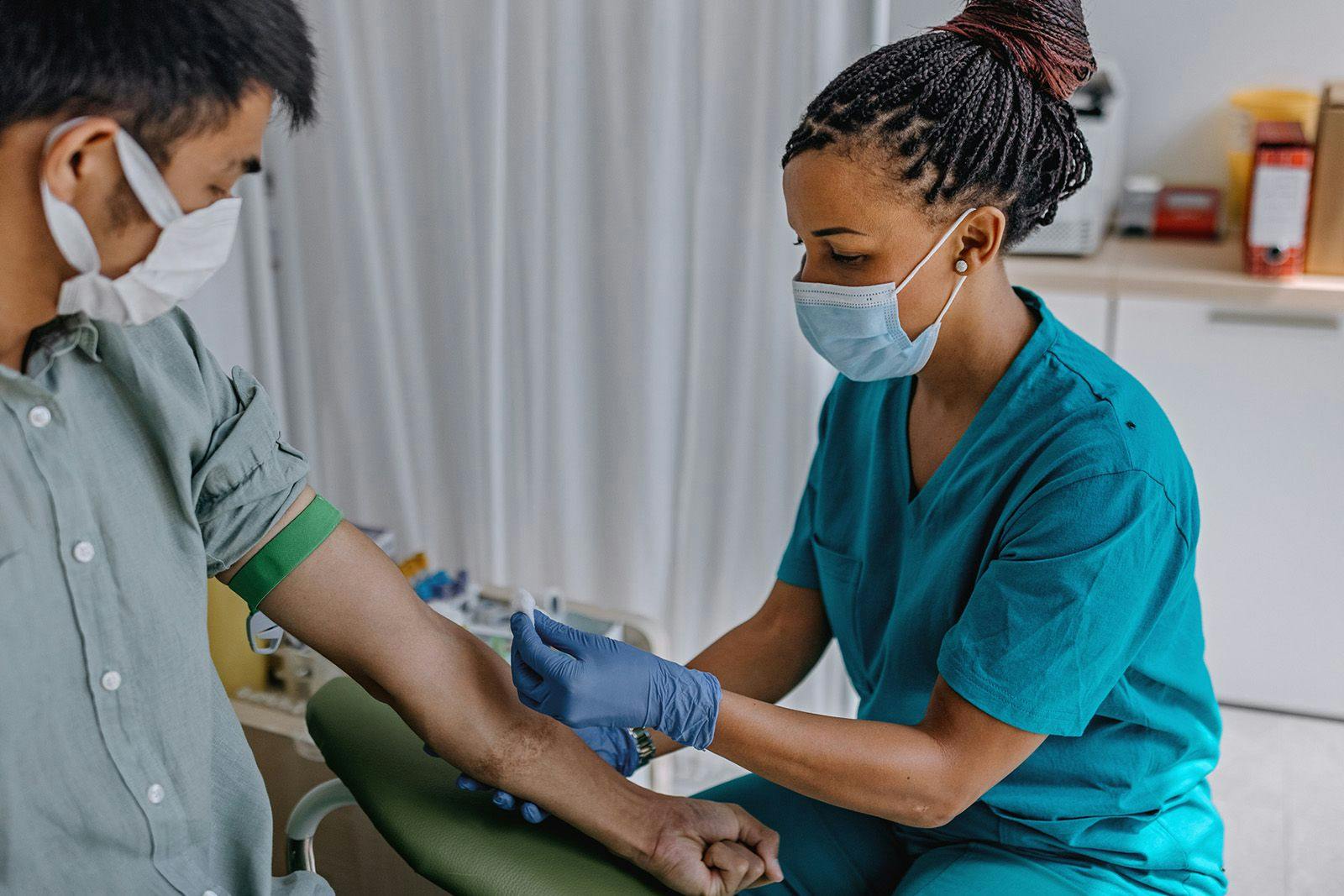If you have been considering beginning a career in healthcare, phlebotomy certification may be the ideal way to begin.
The Bureau of Labor Statistics projects that phlebotomy jobs will increase about 10% between 2021 and 2031 [1], faster than most jobs. Phlebotomy is an inexpensive way to start working in the medical field, in some cases, debt-free.
Phlebotomy training takes less time than medical assistant training or full-fledged medical school. Wondering what you learn in a phlebotomy class? Let's delve into the specifics.
Certified phlebotomists are expected to have a solid understanding of best practices for healthcare, some medical terminology, safe blood draw methodologies, and a strong interpersonal aptitude.
Phlebotomy technicians often work in medical offices, clinics, hospitals, and medical laboratories. You may be wondering what you learn in phlebotomy training; this article is here to answer those questions.
What is Phlebotomy?
Phlebotomy is the act of removing blood from the body for medical examination and analysis. Blood draws are most commonly performed by puncturing a vein in the arm with a needle. This is also known as a venipuncture.

What Does a Phlebotomy Technician Do?
Phlebotomists draw blood from patients for testing, so the blood can be analyzed in a medical laboratory. The patient’s blood is usually drawn into a vial and sent to a laboratory to be analyzed. Healthcare workers may collect these blood samples in order diagnose a patient’s medical condition or form a diagnosis.
A phlebotomist may also prepare blood for transfusions or collect blood for donations to a blood bank.
What Do You Learn in Phlebotomy School?
Curious about the phlebotomy course description? Let's break it down. Here are the things that a good phlebotomy training program will teach students.
- General phlebotomy techniques
- Specimen preparation and handling
- Infection control and safety
- Medical terminology
- Medical ethical, legal, and regulatory matters
- Anatomy
- Communication
- Externship in a clinical setting
General Phlebotomy Techniques
In a comprehensive phlebotomy technician course description, students dive into the basic general phlebotomy practices. Some of the basic general phlebotomy practices you will learn are anatomical site selection, patient preparation, and how to respond to complications that may occur during a blood draw. Students will learn skin puncture and venipuncture procedures and best practices, along with post-puncture care. They will also learn the anticoagulation theory, and knowledge of pre-analytical sources of error in specimen collection.
Specimen Preparation and Handling
As part of the phlebotomy class, students become extremely familiar with blood collection equipment and understand collection tray identification. A certified phlebotomist should be extremely familiar with blood collection equipment and understand collection tray identification. Once the blood specimen is collected, the must know what to do with the blood sample, how it is handled and stored, and understand protocols for handling, transport, processing, and storage of blood specimens.
Infection Control and Safety
During the phlebotomy technician course, students undergo training in infection control and safety, crucial components of blood collection training. In this important component of blood collection training, you’ll learn how to prevent and control infection, more about clinical and hospital safety. Students will also learn about potential errors performing blood draws, and how to prevent potential biohazard risks.
Medical Terminology
Phlebotomy classes ensure that students acquire the necessary medical terminology to communicate effectively in a medical office setting. Phlebotomy technicians will need to know some medical terminology to work in a medical office. This allows them to communicate clearly with staff.
Anatomy
Students will learn proper vein selection and dealing with post-puncture treatment. Proper vein selection and post-puncture treatment are essential components covered in the phlebotomy course.
Medical Ethics, Regulations, and Legal Concerns
The phlebotomy course delves into the applications of legal implications of phlebotomy and quality assurance, ensuring students are well-versed in medical ethics and regulations. Applications of legal implications of phlebotomy, quality assurance, and legal issues related to blood collection will be covered.
Communication
Interpersonal relations and dealing with workplace stress are integral parts of the communication aspect covered in phlebotomy training. You will learn the basics of interpersonal relations, professional behavior with coworkers and patients, and dealing with workplace stress.
Clinical Externship
As part of the phlebotomy technician course description, students undergo a clinical externship to apply their skills in a practical setting. Most phlebotomy certification training programs also include an externship, where students learn how to draw blood in a clinical setting. This allows students to learn how to properly perform venipunctures in a practical setting.
How Long Does Phlebotomy Training Take to Complete?
The Phlebotomy certification course at Campus, formerly known as MTI College, is about 16 weeks.
The estimated program length assumes a student does not have prior transferable course credit and successfully completes a full course load each term. Actual program length may be longer or shorter depending on factors including, but not limited to, prior academic credit, class availability, academic performance, and attendance.
At the end of this training, students will become a Certified Phlebotomy Technician, also known as a CPT1.
Earn Your Phlebotomy Certificate at Our Sacramento Campus
Campus has two programs that allow students to earn their CPT1 Phlebotomy certification at our Sacramento campus.
Our Phlebotomy program is a 16-week course that gives you the necessary training to become a certified CPT1 phlebotomist in California.
For students who plan on becoming a medical assistant, our Medical Assistant with Phlebotomy Certification program is a 54-week certification training program that will prepare students for medical assistant certification and phlebotomy certification. This will help you launch a career in healthcare.
If you would like more information about either program, fill out the contact form on our site, or call (916) 339-1500 to speak with our Admissions team.
[1]Note: The data provided above are from a source unaffiliated with Campus, are for informational purposes only and represent the employment field as a whole. They are not solely specific to Campus graduates and, by providing the above information, Campus makes no representation, direct or implied, or opinion regarding employability.
